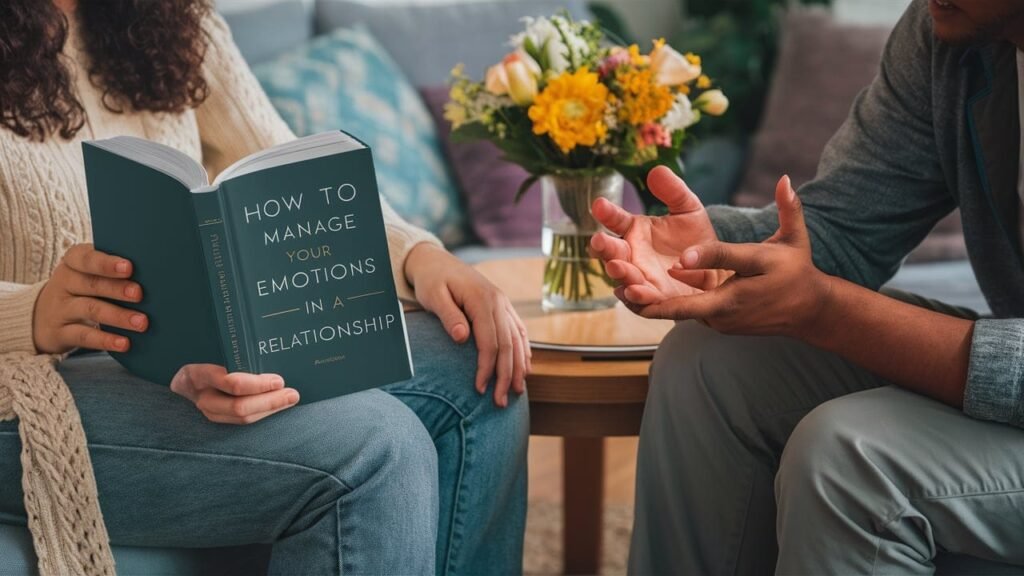Share This Article
James and Michelle have had a loving relationship for years. They have a lot of fun together and do a lot of fun things together . But today is different.
James and Michelle are involved in a heated argument. Michelle just said that James doesn’t care enough about her and that’s why he got angry. In a fit of rage, James abuses Michelle, using terrible words that he immediately regrets. How did this ever come out of his mouth?
James stares at the ground while Michelle gets tears in her eyes. He hurt her and he knows he had to apologize. He walks over to her and puts his arms around her. “I’m so sorry,” he says. “I didn’t mean it when I said you were a […]. I love you.” If only he knew how to control his emotions in situations like this.
Emotions can be difficult to control, especially when it comes to relationships. We all have different ways of expressing feelings and some people find it more difficult to control these than others. But with the right knowledge and tools, you can learn how to better manage your emotional responses. For yourself, for others and for a healthy relationship.
ALSO READ: Man or Woman with Luggage? This Means Emotional Baggage in Relationships
What are emotions?
Let’s start with some more information about what exactly emotions are . Emotions are our primary response to events, making us feel dependent on the situation around us. They are often caused by thoughts, memories or physiological processes that take place in our brain.
Emotions can range from love to anger and everything in between – they help us navigate difficult moments and direct our behavior in a good or bad direction. If you want to build and maintain a healthy relationship , you will benefit from learning how to balance these emotional responses.
ALSO READ: Too Much Together? 9 Signs You’re Spending Too Much Time Together

8 tips for managing emotions
Keeping your emotions in check can be a challenge. It is not easy to remain cool and calm when you feel that you are being wronged. Or if your partner fails to keep the agreements again. But rest assured: it is possible. These are some tips to manage your emotions.
1. Be more aware of your emotions
This can help identify what is going on for you, allowing you to better understand the situation. It also helps you make better decisions when problems arise. You can do exercises, such as meditating or writing a diary, to become more in touch with what is going on inside you, what you feel and how you think in certain situations.
2. Take a time-out
If you notice the negative feelings becoming overwhelming, take a time-out. It is the best time to take a break from the situation and return when you are calmer and thinking clearly. Timeouts also give you time to think about what’s going on and how you can respond in a productive way rather than impulsively. This will at least prevent you from reacting out of frustration or anger.
ALSO READ: Relationship is No Longer Fun? 14 Signs That Things are Not Going Well
3. Try to stay calm with breathing exercises
Breathing exercises help regulate stress levels by bringing down hormonal levels. By breathing deeply (inhale for 4 seconds) and exhale slowly (exhale for 4 seconds) you can calm your body again. Repeat this several times – or as often as necessary – until you feel calmer. Breathing exercises also help because they mentally disconnect you from the outside world.
4. Set realistic expectations
Having high expectations in a relationship can lead to greater disappointments. As you understand, this can again result in emotional problems. Therefore, try to be realistic about what you expect from the relationship and, above all, understand that no relationship is perfect .
ALSO READ: 26 Things You Don’t Want to Hear from Your Partner
5. Communicating about feelings and needs
Communication is essential to a good relationship, so make sure you always clearly explain what you feel and what you need to be happy. Openness and honesty are important in this process because it helps both of you express your feelings and avoid misunderstandings.
6. Relax more and more often
Take time for yourself by doing what makes you happy. Are you crazy about sports? Like walking, jogging or something else you like to do? Then make time for it. You can also do something fun with your partner more often, for example by going to the movies or a restaurant regularly. Or plan adventurous activities together to be more connected.
ALSO READ: 12 Things You Need to Know Before Your First Relationship
7. Think about what you can do about it
If conflicts arise in the relationship, try to take action on your own initiative. What can help to solve the problem? Is an ‘sorry’ enough, but are you too proud to admit your mistake ? For example, listen to each other’s opinions or make small compromises that satisfy both of you.
8. Be willing to compromise
Accepting different points of view is part of any relationship. No one thinks the same about everything. That also means a form of willingness to make concessions for a good cause. That good goal is the relationship.
By applying these tips to real-life situations, you can learn how to better manage your emotional responses. The foundation of this is understanding yourself and others – so be patient with yourself as you work on this.
P.S. Are you already following Gistinger.com on Facebook , Instagram and Twitter?

